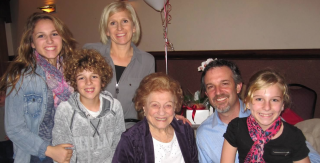Gratitude
Gratitude: What I Learned from Anne Frank and My Grandma
A visit to the Museum of Tolerance touches generations and teaches gratitude.
Posted February 13, 2014

My heart is heavy. Yet, I have an overwhelming feeling of gratitude. My wife and I took our three children to the Museum of Tolerance in Los Angeles to see the Anne Frank exhibit today. Why? Because my oldest daughter is studying Anne Frank in school, we are Jewish, and our younger two children were asking us what the Holocaust was. It was time.
Only about 80 years ago, Jews started to be marginalized and discriminated against in Germany, then taken from their homes, separated from their family, and most murdered. While I too studied the Holocaust and Anne Frank in middle school like my daughter, my experience of her story and the stories of the others who suffered, lost, and survived was far more impactful as an adult with three children.
Anne and her family lived in hiding for two years, and while scared, most of Anne’s thoughts and words were filled with faith in the people and humanity. She wrote of the beauty of life, and had wonder for the world and those who inhabited it. As I listened to her words spoken from her diary, I felt a sense of awe and respect for a wise, courageous, and brave child who has taught the world so much. I simultaneously felt a sense of gratitude for what I have in my life—a wife, three healthy children, family, a home, and a country where I am free regardless of my background or beliefs. I also felt some shame—shame that I do not think enough about those who have suffered, are suffering around the world, and that I do not feel grateful every moment of every day for what I have.
This brings me to why we flew to Los Angeles. We came to celebrate my grandmother’s 103rd birthday. Just as we have the last six years or so, my aunts, uncles, and cousins gather for the celebration of the most amazing woman any of us have ever known at her favorite Chinese restaurant. My grandmother, born in 1911, in Latvia has trouble remembering what she had for breakfast. However, she still remembers bullets flying overhead when leaving her village at age four, and being lucky to be taken in with her mother into a barn by a kind farmer when she was ill. She remembers immigrating to Ellis Island, moving to Ohio, Los Angeles, Ohio, and (after the attack on Pearl Harbor) back to Los Angeles with her four children. She also remembers standing in line with me for two hours in Century City to watch Star Wars—and so do I.
Most of all, what my grandma remembers, is how grateful she is to have family to love. Regardless of life’s curve balls to her own and extended family, she smiled, shrugged, and lived with the motto of “what will be will be.” When she sees you, she looks at you with her sparkling eyes, hugs you, kisses you, and talks to you as if she loves you more than anyone else in the world. Yet, she loves all 10 of her grandchildren and all 15 of her great grandchildren the same. Every year we celebrate another year of her life, and she says she hopes to celebrate with us all next year.
As I was saying goodbye to her last night, it felt different. There was a different look in her eyes. She reminded me how much she loved me and my family, and told me never to forget it. I did my best to take it all in, not knowing if I will look into her loving eyes and feel her loving presence again. I told her, as I always do, that she is always with me. I am grateful I had that moment.
Anne Frank’s love of life, suffering, and untimely end, and my grandmother’s fully lived life, leave me with a commitment to live life with gratitude. While I try to live in the moment and appreciate what I have, all too often the stresses of work and life chip away at my gratitude. We must focus on what we have instead of what we don’t. We must be grateful for our freedom, our family, our work, our shelter, and our food. I am grateful I can think and write anywhere I want, rather than in a dark room fearing for my life. I am grateful that my grandma has influenced my life for 43 years with love and acceptance.
As our kids were fighting in the back seat on the way to the airport, I took my wife’s hand and told her we are lucky to have them and to all be together—then told them we would take the iPad away if they didn’t stop fighting over it.


